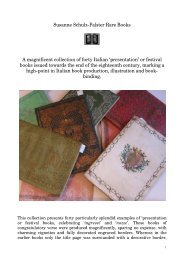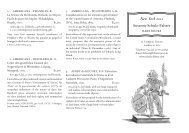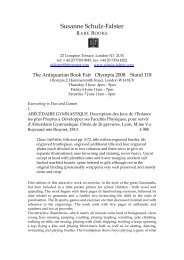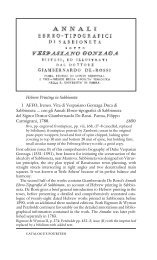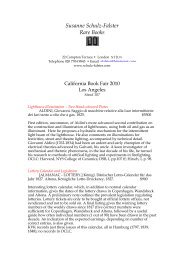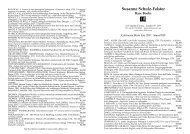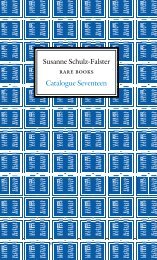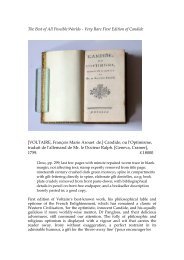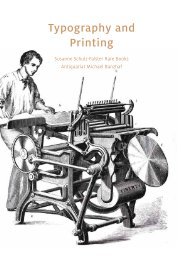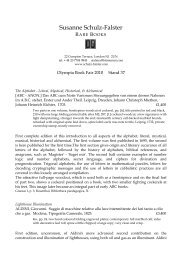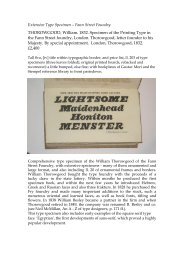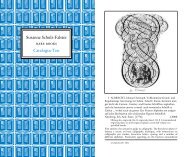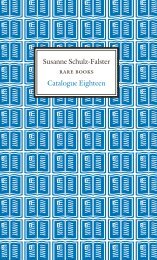Catalogue Number 12 - Susanne Schulz-Falster
Catalogue Number 12 - Susanne Schulz-Falster
Catalogue Number 12 - Susanne Schulz-Falster
You also want an ePaper? Increase the reach of your titles
YUMPU automatically turns print PDFs into web optimized ePapers that Google loves.
After twelve months at thirty days each, there would be Wve remaining festival<br />
days in the year, for talent (genie), industry, heroic deeds, and ideas<br />
(opinions) respectively. After a brief introduction to the calendar, details<br />
for reluctant ‘republicans’, i.e. some satirical facts of the new regime are<br />
given. Its institutions, government, and foreign relations are criticized,<br />
with the brief observation, that all population increase will be kept in check<br />
by the guillotine.<br />
The revolutionary calendar is followed by a Christian calendar for the<br />
year 1794, together with a declaration of allegiance to the monarchy.<br />
OCLC lists one copy at the university of Chicago (under Fabre d’Eglantine), not<br />
found in Grand-Carteret, Welschinger, Les Almanachs de la Révolution,<br />
Monglond, or Tourneux.<br />
In Praise of the French Language<br />
69 RIVAROL, Antoine de. Dissertations sur l’Universalité de la<br />
Langue Françoise, qui ont partagé le Prix adjugé par l’Académie<br />
Royale des Sciences et Belles-Lettres le 3 Juin, MDCCLXXXIV.<br />
Berlin, George Jacques Decker, Imprimeur du Roi, 1784.<br />
[Bound with:] SCHWAB, Jean Christophe. Dissertation sur<br />
l’Universalité de la Langue Françoise. Beantwortung der von<br />
der Könglichen Akademie der Wissenschaften in Berlin furs Jahr<br />
1784 aufgegebenen Preisfrage: Was ist es, das die Französische<br />
Sprache zu einer Universalsprache in Europa gemacht hat.<br />
Wodurch verdient sie diesen Vorzug? Ist zu vermuthen, daß<br />
sie ihn behalten werde? £2800<br />
Two works in one volume, 4to, pp. [ii], 52; 87; uncut, title page dustsoiled<br />
with some staining, two tears to lower margin strengthened from<br />
verso, signatures B and C of the second work with some marginal<br />
damp-staining; recent marbled boards, with printed label to spine and<br />
upper boards; small unidentiWed heraldic stamp to verso of title.<br />
First edition, very rare, of Rivarol’s prize-winning essay on the universality<br />
of the French language, published by the Berlin Academy of Sciences, together<br />
with Schwab’s essay on the same question. Brief, brilliant, and aphoristic,<br />
this celebration of the glory of the French language is included in<br />
even the briefest history of the French language and has served as an indicator<br />
for the pride the French take in their language and culture. Rivarol<br />
maintained that there was no need to look further for a universal language,<br />
as French already possessed all the necessary characteristics. In a sweeping<br />
overview he condenses centuries of French linguistic history and celebrates<br />
French culture.<br />
Umberto Eco sums up his main points: ‘Apart from its intrinsic perfection,<br />
French was already an international language; it was the language<br />
most diVused in the world, so much that is was possible to speak of the<br />
‘French world’ just as, in antiquity, one could speak of the ‘Roman world’.<br />
susanne schulz-falster rare books catalogue twelve<br />
According to Rivarol, French possessed a phonetic system that guaranteed<br />
sweetness and harmony, as well as a literature incomparable in its richness<br />
and grandeur; ... In comparison with French all other languages paled: German<br />
was too guttural, Italian too soft, Spanish to redundant, English too<br />
obscure. Rivarol attributed the superiority of French to its word order: Wrst<br />
subject, then verb, and last object. This word order mirrored a natural logic<br />
which was in accordance with the requirements of common sense’. Rivarol<br />
condenses his arguments in great aphoristic style: ‘Ce qui n’est pas clair,<br />
n’est pas français’.<br />
Rivarol (1754–1801), a man of letters, journalist and pamphleteer, was<br />
celebrated in Paris for his learning, wit, and brilliant conversation. He left<br />
France during the French revolution, stayed brieXy in England, where he<br />
was respectfully received by Pitt and Burke, in spite of his dismissive remarks<br />
on English language and literature. He later moved to Hamburg,<br />
where he composed his ‘Discours préliminaire du nouveau dictionnaire de la<br />
langue française’ in 1797, an attempt to present the human mind through<br />
the evolution of language, particularly the French language.<br />
The Wrst edition of this work is very rare, it was reprinted the same year<br />
with a ‘Berlin and Paris imprint (à Berlin, et se trouve à paris, chez Baily et<br />
Dessenne) , with a further edition following in 1797.<br />
En Français dans le Texte 177; Cioranescu 53293; Tchemerzine IX, p. 103 (mistakenly<br />
listing the second issue as the original); OCLC lists just one copy at the Boston<br />
Athenaeum, RLIN adds just microWlms; see Umberto Eco, The search for the perfect<br />
language, 1995.<br />
70 RIZZETTI, Luigi. Riforma de’ Carri di Quattro Ruote.<br />
Trevigi, A Spese dell’Autore, 1785. £2200<br />
Tall 8vo, pp. [ii], [viii], cxii, large engraved title vignette showing a<br />
carriage, nine folding engraved plates bound at the end; uncut in the<br />
original buV stiV wrappers, spine lettered in manuscript; covers a little<br />
dust-soiled, but in all a very Wne copy.



